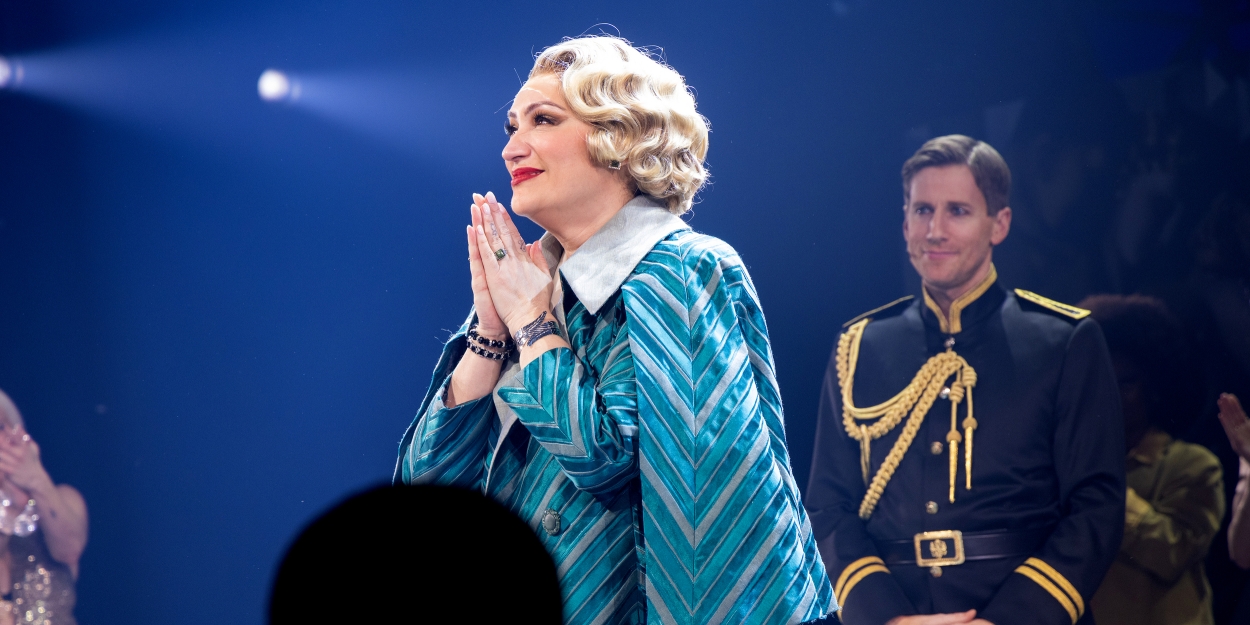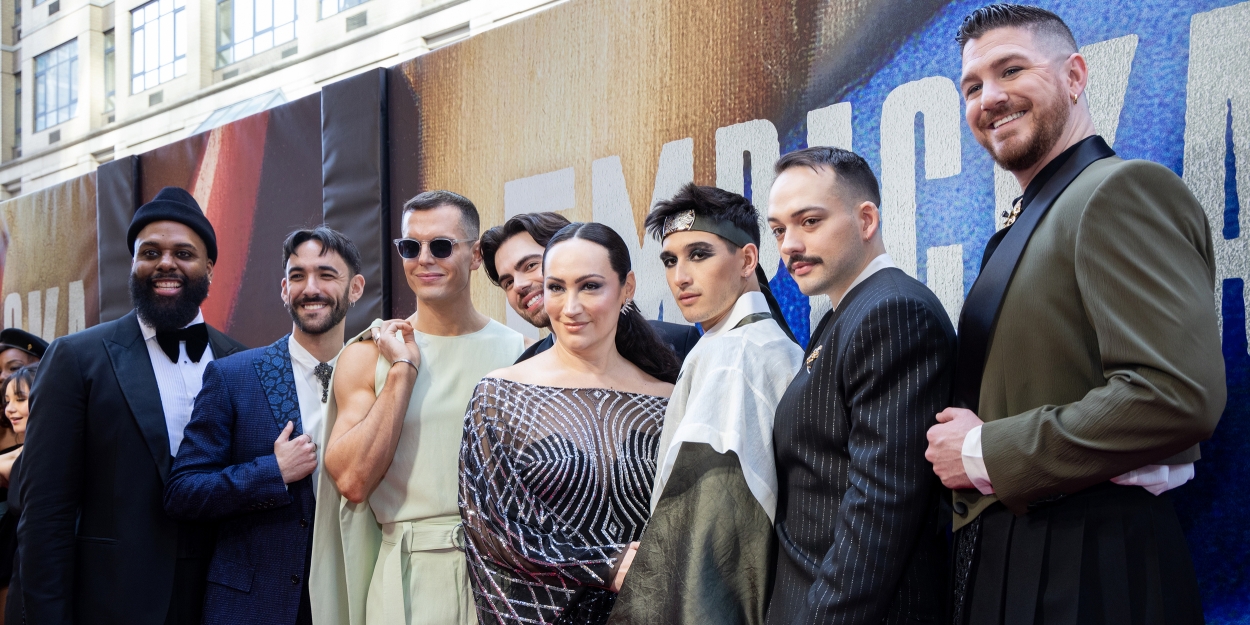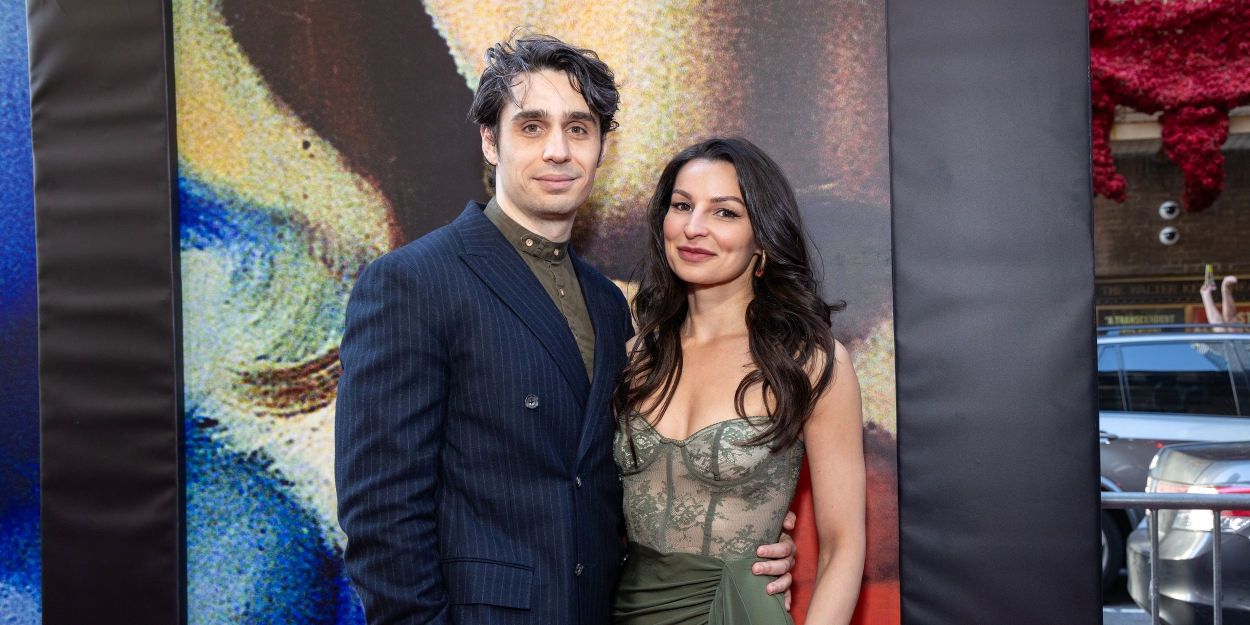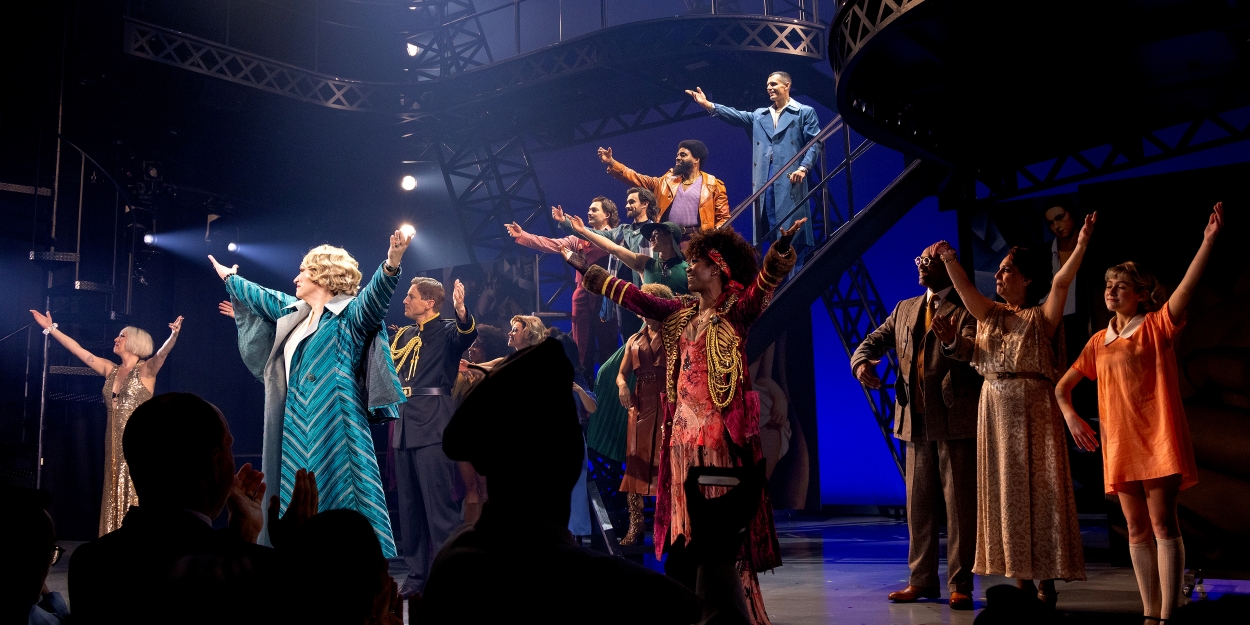Review Roundup: LEMPICKA Opens on Broadway
Check out what the critics are saying about Lempicka on Broadway!
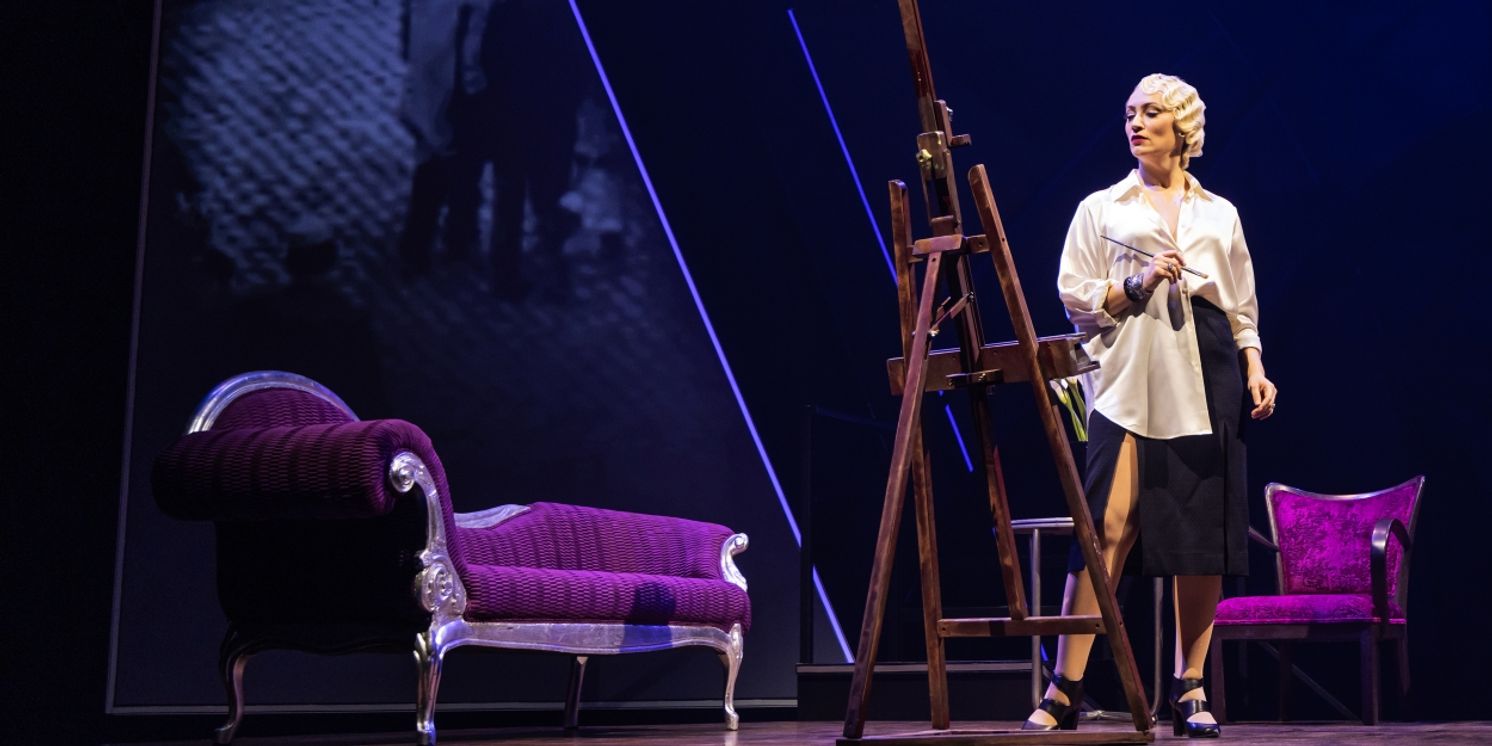
Lempicka, the new musical portrait of artist Tamara de Lempicka, just opened on Broadway at the Longacre Theatre. The new musical is directed by Rachel Chavkin, and features book, lyrics and original concept by Carson Kreitzer, book and music by Matt Gould, and choreography by Raja Feather Kelly.
Lempicka stars Eden Espinosa as Tamara de Lempicka, Amber Iman as Rafaela, Andrew Samonsky as Tadeusz Lempicki, George Abud as Marinetti, Natalie Joy Johnson as Suzy Solidor, Zoe Glick as Kizette, Nathaniel Stampley as the Baron, and Beth Leavel as the Baroness with Mariand Torres, Alex Aquilino, Lauren Blackman, Stephen Brower, Kyle Brown, Holli’ Conway, Abby Matsusaka, Jimin Moon, Khori Michelle Petinaud, Ximone Rose, Nicholas Ward, Veronica Fiaoni, Mary Page Nance, Julio Rey, and Michael Milkanin rounding out the company.
BroadwayWorld has gathered reviews from all of New York City's top theatre critics. Let's see what they had to say...
![]() Jesse Green, New York Times: That there is little if any historical truth in that characterization is not ultimately the problem. The painter Georges Seurat in “Sunday in the Park With George” — a show referenced in the first lines of the script — is largely fictionalized too, a cad to his mistress and generally unlikable. “Lempicka” doesn’t have the craft, especially in the mis-accented, often vague lyrics, to make its title character a relatable modern woman, nor the boldness to let her be awful and great. Perhaps if it were less of a machine she could be more of a monster.
Jesse Green, New York Times: That there is little if any historical truth in that characterization is not ultimately the problem. The painter Georges Seurat in “Sunday in the Park With George” — a show referenced in the first lines of the script — is largely fictionalized too, a cad to his mistress and generally unlikable. “Lempicka” doesn’t have the craft, especially in the mis-accented, often vague lyrics, to make its title character a relatable modern woman, nor the boldness to let her be awful and great. Perhaps if it were less of a machine she could be more of a monster.
![]() Philip Kennicott, The Washington Post
: In “Lempicka,” history is, as they say, just one dance number after another. It summons the shocks and jolts that forge the identity and resiliency of the artist, which doesn’t yield an actual character, but more of a ready-made hero for contemporary political tastes. Espinosa does heroic work tying the threads together, but instead of inhabiting a character with multiple facets, she’s left to reconcile multiple characters serving various theatrical purposes.
Philip Kennicott, The Washington Post
: In “Lempicka,” history is, as they say, just one dance number after another. It summons the shocks and jolts that forge the identity and resiliency of the artist, which doesn’t yield an actual character, but more of a ready-made hero for contemporary political tastes. Espinosa does heroic work tying the threads together, but instead of inhabiting a character with multiple facets, she’s left to reconcile multiple characters serving various theatrical purposes.
![]() Frank Rizzo, Variety: Certainly Eden Espinosa, starring in the title role, brings both luminosity and strength to her powerful performance as the ambitious, visionary and resilient artist known for capturing the women of her day in an aspirational light: perfectly poised, coiffed and seemingly glowing from within. But the musical’s titular character is not so polished. Rather she’s a complicated woman — to a fault. This might not be as much of a concern in a thick biography, but it’s harder to convey successfully in a musical where a clearer line is needed as it follows epochs of life, society and art.
Frank Rizzo, Variety: Certainly Eden Espinosa, starring in the title role, brings both luminosity and strength to her powerful performance as the ambitious, visionary and resilient artist known for capturing the women of her day in an aspirational light: perfectly poised, coiffed and seemingly glowing from within. But the musical’s titular character is not so polished. Rather she’s a complicated woman — to a fault. This might not be as much of a concern in a thick biography, but it’s harder to convey successfully in a musical where a clearer line is needed as it follows epochs of life, society and art.
![]() Adam Feldman, TimeOut: The result is a musical that sometimes embraces campiness and sometimes falls flat into camp, especially when it skirts melodrama: When kohl-eyed chorus boys, repurposed as brownshirts, violently raid Solidor’s queer bar—and then the show cuts to a wild-eyed Beth Leavel belting “It’s the end of time!!” straight at the audience—I challenge you not to giggle. And where in time are we supposed to be, exactly? By this point in the show, Lempicka seems to have abandoned history entirely: Why is the futurist Italian painter Filippo Marinetti (an emphatic George Abud) leading what appears to be a police raid in Paris in the 1930s? It doesn’t help that another musical in town right now, Cabaret, depicts queerness and fascism with a great deal more depth.
Adam Feldman, TimeOut: The result is a musical that sometimes embraces campiness and sometimes falls flat into camp, especially when it skirts melodrama: When kohl-eyed chorus boys, repurposed as brownshirts, violently raid Solidor’s queer bar—and then the show cuts to a wild-eyed Beth Leavel belting “It’s the end of time!!” straight at the audience—I challenge you not to giggle. And where in time are we supposed to be, exactly? By this point in the show, Lempicka seems to have abandoned history entirely: Why is the futurist Italian painter Filippo Marinetti (an emphatic George Abud) leading what appears to be a police raid in Paris in the 1930s? It doesn’t help that another musical in town right now, Cabaret, depicts queerness and fascism with a great deal more depth.
![]() Robert Hofler, The Wrap: And now for the other shoe to drop. Why have Kreitzer and Gould given their Lempicka nothing but loud, caterwauling screeds to sing? Once upon a time, Espinosa played Elphaba in “Wicked” on Broadway, and here, she appears stuck trying to top “Defying Gravity” in one female empowerment anthem after another. We get it! Tamara de Lempicka is a most liberated woman. Only when the title character is off the stage are we able to give our ears a respite from all the noise. Equally loud but even more grating is the performance of George Abud, who plays a Nazi Emcee on leave from “Cabaret.”
Robert Hofler, The Wrap: And now for the other shoe to drop. Why have Kreitzer and Gould given their Lempicka nothing but loud, caterwauling screeds to sing? Once upon a time, Espinosa played Elphaba in “Wicked” on Broadway, and here, she appears stuck trying to top “Defying Gravity” in one female empowerment anthem after another. We get it! Tamara de Lempicka is a most liberated woman. Only when the title character is off the stage are we able to give our ears a respite from all the noise. Equally loud but even more grating is the performance of George Abud, who plays a Nazi Emcee on leave from “Cabaret.”
![]() Elysa Gardner, New York Sun: As Tamara, Eden Espinosa gets to once again use the siren-like belt and the mix of might and vulnerability she deployed during several stints as Elphaba in “Wicked” — this time while sporting a platinum-blonde bob that makes her look like 1990s-era Madonna (a noted Lempicka fan, naturally). Granted, the vocal showcases she is provided by composer Matt Gould and lyricist Carson Kreitzer — who collaborated on the book, brd on Ms. Kreitzer’s concept — are seldom as tuneful as they are flamboyant.
Elysa Gardner, New York Sun: As Tamara, Eden Espinosa gets to once again use the siren-like belt and the mix of might and vulnerability she deployed during several stints as Elphaba in “Wicked” — this time while sporting a platinum-blonde bob that makes her look like 1990s-era Madonna (a noted Lempicka fan, naturally). Granted, the vocal showcases she is provided by composer Matt Gould and lyricist Carson Kreitzer — who collaborated on the book, brd on Ms. Kreitzer’s concept — are seldom as tuneful as they are flamboyant.
![]() Dan Rubins, Slant Magazine: Lempicka sometimes recalls another unfortunate histrionic history. Diana the Musical, while disastrous on paper, recognized its own essential ridiculousness, rebranded itself as utter camp, and gracefully ended its short Broadway run with a naughty wink. But a musical about Princess Diana was clearly a terrible idea. Lempicka, by contrast, is always on the cusp of camp but unable to look itself in the mirror, so it never stands a chance of being so bad it’s good because it wants to be good so badly. It’s that friction—the tendency toward high camp in conflict with a more austere self-importance—that suggests a show at war with itself.
Dan Rubins, Slant Magazine: Lempicka sometimes recalls another unfortunate histrionic history. Diana the Musical, while disastrous on paper, recognized its own essential ridiculousness, rebranded itself as utter camp, and gracefully ended its short Broadway run with a naughty wink. But a musical about Princess Diana was clearly a terrible idea. Lempicka, by contrast, is always on the cusp of camp but unable to look itself in the mirror, so it never stands a chance of being so bad it’s good because it wants to be good so badly. It’s that friction—the tendency toward high camp in conflict with a more austere self-importance—that suggests a show at war with itself.
![]() Greg Evans, Deadline: Though the musical’s book and lyrics remain doggedly by-the-numbers, Chavkin’s direction (and a good cast that includes Andrew Samonsky, Amber Iman, George Abud, Beth Leavel and Natalie Joy Johnson) keeps Lempicka barreling through the last century’s wartime horrors, peacetime optimism and an art that grew from both.
Greg Evans, Deadline: Though the musical’s book and lyrics remain doggedly by-the-numbers, Chavkin’s direction (and a good cast that includes Andrew Samonsky, Amber Iman, George Abud, Beth Leavel and Natalie Joy Johnson) keeps Lempicka barreling through the last century’s wartime horrors, peacetime optimism and an art that grew from both.
![]() Chris Jones, Chicago Tribune: Indeed, a perceived need to glob on enough sexy-modern Broadway pizzazz to appeal to a broader public might well be what torpedoed “Lempicka,” now at the Longacre Theatre. This potentially appealing show would have sat more easily as a feminist, non-musical drama in a less pressured space, where the director, Rachel Chavkin, and the performers, all too aware of their need to liven up this clunky bio-musical, did not have to push so darn hard.
Chris Jones, Chicago Tribune: Indeed, a perceived need to glob on enough sexy-modern Broadway pizzazz to appeal to a broader public might well be what torpedoed “Lempicka,” now at the Longacre Theatre. This potentially appealing show would have sat more easily as a feminist, non-musical drama in a less pressured space, where the director, Rachel Chavkin, and the performers, all too aware of their need to liven up this clunky bio-musical, did not have to push so darn hard.
![]() Jonathan Mandell, New York Theater: In any case, the show’s oft-mentioned fusion of humanity with machinery suddenly struck me as a clarifying metaphor for my mixed reaction to “Lempicka,” which opened on Broadway tonight at the Longacre. Carson Kreitzer, who conceived of the musical and co-wrote the libretto with Matt Gould, has created some artful lyrics for Gould’s music. Director Rachel Chavkin oversees some precisely calibrated moments. Naturally gifted cast members give polished performances, most notably Eden Espinosa in the title role, and especially Amber Iman as Rafaela. But the songs and scenes ultimately add up to an almost mechanical-feeling sameness, loud and overwhelming.
Jonathan Mandell, New York Theater: In any case, the show’s oft-mentioned fusion of humanity with machinery suddenly struck me as a clarifying metaphor for my mixed reaction to “Lempicka,” which opened on Broadway tonight at the Longacre. Carson Kreitzer, who conceived of the musical and co-wrote the libretto with Matt Gould, has created some artful lyrics for Gould’s music. Director Rachel Chavkin oversees some precisely calibrated moments. Naturally gifted cast members give polished performances, most notably Eden Espinosa in the title role, and especially Amber Iman as Rafaela. But the songs and scenes ultimately add up to an almost mechanical-feeling sameness, loud and overwhelming.
![]() Gillian Russo, New York Theatre Guide: It’s fitting that the musical named for her wages a similar battle as it unfolds at the Longacre Theatre. An uneven, exposition-heavy book by Carson Kreitzer and Matt Gould, and an industrial set by Riccardo Fernandez, are the show's more mechanical elements. But superb lighting design by Bradley King, an eclectic and electric score, and captivating performances are the pulsating flesh and blood that ultimately render Lempicka’s flaws like stray paint specks on canvas: keeping the work from “perfection,” maybe, but not ruining it. Ultimately, Lempicka is ravishing — and one of the best new musicals this season.
Gillian Russo, New York Theatre Guide: It’s fitting that the musical named for her wages a similar battle as it unfolds at the Longacre Theatre. An uneven, exposition-heavy book by Carson Kreitzer and Matt Gould, and an industrial set by Riccardo Fernandez, are the show's more mechanical elements. But superb lighting design by Bradley King, an eclectic and electric score, and captivating performances are the pulsating flesh and blood that ultimately render Lempicka’s flaws like stray paint specks on canvas: keeping the work from “perfection,” maybe, but not ruining it. Ultimately, Lempicka is ravishing — and one of the best new musicals this season.
![]() David Finkle, New York Stage Review: Attempting to lend Lempicka a canvas broader than Lempicka’s voluptuous canvases, Kreitzer and Gould arrange a stylized look at the Russian Revolution — and its eventually sending Tamara and Tadeusz, penniless and unprepared to work for a living, to Paris. They bookend that theatrical documentation with a fascist-foreboding routine, highlighted by symbolic figure Marinetti (the hyper-active George Abud) conjuring Hitler’s rise. (Choreographer Kelly, always at the ready, has his indefatigable contingent execute gestures subtly suggesting German citizens “Heil”-ing.)
David Finkle, New York Stage Review: Attempting to lend Lempicka a canvas broader than Lempicka’s voluptuous canvases, Kreitzer and Gould arrange a stylized look at the Russian Revolution — and its eventually sending Tamara and Tadeusz, penniless and unprepared to work for a living, to Paris. They bookend that theatrical documentation with a fascist-foreboding routine, highlighted by symbolic figure Marinetti (the hyper-active George Abud) conjuring Hitler’s rise. (Choreographer Kelly, always at the ready, has his indefatigable contingent execute gestures subtly suggesting German citizens “Heil”-ing.)
![]() Sandy MacDonald, New York Stage Review: Power-contralto Eden Espinosa strives mightily to keep Lempicka – an overstuffed, formulaic musical – in forward motion, to mixed effect. Despite the evident willingness of co-creators Carson Kreitzer and Matt Gould to play fast and loose with history, the show plugs along like a Bugatti (an emblematic subject of the Polish-born painter) in need of a lube job.
Sandy MacDonald, New York Stage Review: Power-contralto Eden Espinosa strives mightily to keep Lempicka – an overstuffed, formulaic musical – in forward motion, to mixed effect. Despite the evident willingness of co-creators Carson Kreitzer and Matt Gould to play fast and loose with history, the show plugs along like a Bugatti (an emblematic subject of the Polish-born painter) in need of a lube job.
![]() Matthew Wexler, Queerty: “Why were they voguing?” my companion asks at intermission, referring to a dance sequence early in the show. “Ah, that makes sense,” she responds with a slightly perplexed look after I explain the Madonna connection. Herein lies Lempicka’s challenge: the musical wants to capitalize on Madonna and other pop stars’ notoriety along with sense of agency uncommon to female artists of the era, but its creators have stretched the canvas so thin that the brush strokes crack.
Matthew Wexler, Queerty: “Why were they voguing?” my companion asks at intermission, referring to a dance sequence early in the show. “Ah, that makes sense,” she responds with a slightly perplexed look after I explain the Madonna connection. Herein lies Lempicka’s challenge: the musical wants to capitalize on Madonna and other pop stars’ notoriety along with sense of agency uncommon to female artists of the era, but its creators have stretched the canvas so thin that the brush strokes crack.
![]() Brian Scott Lipton, Cititour: Yet, under Rachel Chavkin’s surprisingly frazzled direction, the show, now at the Longacre Theatre, often feels like you’re watching someone put together a misguided collage – one that often incorporates elements of other stronger musicals, most notably “Cabaret” -- as it struggles to decide what story it wants to tell us and what message we’re supposed to take ith us as we leave the theatre. Women can do anything? Women never get the same credit as men? Women are brilliant? Art isn’t easy? You tell me?
Brian Scott Lipton, Cititour: Yet, under Rachel Chavkin’s surprisingly frazzled direction, the show, now at the Longacre Theatre, often feels like you’re watching someone put together a misguided collage – one that often incorporates elements of other stronger musicals, most notably “Cabaret” -- as it struggles to decide what story it wants to tell us and what message we’re supposed to take ith us as we leave the theatre. Women can do anything? Women never get the same credit as men? Women are brilliant? Art isn’t easy? You tell me?
![]() Deb Miller, DC Theater Arts: Lempicka offers a theatrical manifestation of the revival of interest in a woman artist who embraced the avant-garde style of Art Deco, along with a privileged lifestyle and free sexuality, as stated in her own bombastic and defiant words: “I live life in the margins of society, and the rules of normal society don’t apply to those who live on the fringe.” If only the sexualization of women and their nudity in art were not so standard. As questioned in the famous poster by the feminist/activist group Guerrilla Girls in 1989, “Do women have to be naked to get into the Met Museum?,” noting that “less than 5% of the artists in the Modern Art section were women, but 85% of the nudes were female.”
Deb Miller, DC Theater Arts: Lempicka offers a theatrical manifestation of the revival of interest in a woman artist who embraced the avant-garde style of Art Deco, along with a privileged lifestyle and free sexuality, as stated in her own bombastic and defiant words: “I live life in the margins of society, and the rules of normal society don’t apply to those who live on the fringe.” If only the sexualization of women and their nudity in art were not so standard. As questioned in the famous poster by the feminist/activist group Guerrilla Girls in 1989, “Do women have to be naked to get into the Met Museum?,” noting that “less than 5% of the artists in the Modern Art section were women, but 85% of the nudes were female.”
![]() Joey Sims, Theatrely: The most fatal issue, though, is the show’s central focus on Tamara’s dueling loves: stiff husband Tadeusz and free-wheeling Rafaela. This dilemma takes up most of the narrative real estate, but proves deathly dull. Despite the heavenly-voiced Samonsky’s best efforts, Tadeusz is a wet blanket whose constant moaning sucks the energy out of every scene. And while Iman could never be anything but riveting on stage, Rafaela is thinly-sketched and never takes on compelling internal life.
Joey Sims, Theatrely: The most fatal issue, though, is the show’s central focus on Tamara’s dueling loves: stiff husband Tadeusz and free-wheeling Rafaela. This dilemma takes up most of the narrative real estate, but proves deathly dull. Despite the heavenly-voiced Samonsky’s best efforts, Tadeusz is a wet blanket whose constant moaning sucks the energy out of every scene. And while Iman could never be anything but riveting on stage, Rafaela is thinly-sketched and never takes on compelling internal life.
![]() Johnny Oleksinski, New York Post: Unfortunately, having garishly blared open Sunday night at the Longacre Theatre, it’s far too late for the creators to start over again on a blank canvas. And so, the ugly splatter that audiences are left to parse is a ridiculous two-and-half-hour Eurovision act with stratospheric delusions of grandeur.
Johnny Oleksinski, New York Post: Unfortunately, having garishly blared open Sunday night at the Longacre Theatre, it’s far too late for the creators to start over again on a blank canvas. And so, the ugly splatter that audiences are left to parse is a ridiculous two-and-half-hour Eurovision act with stratospheric delusions of grandeur.
Average Rating: 46.1%
- To read more reviews, click here!
- Discuss the show on the BroadwayWorld Forum
Reader Reviews
Powered by
|
Videos


